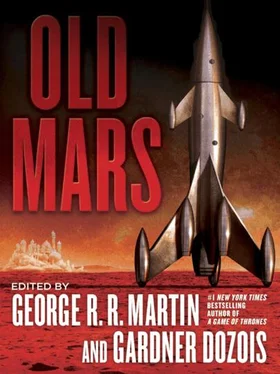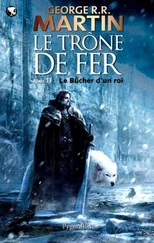Late in the afternoon, he saw it from the corner of an eye and turned toward the long, boulder-strewn slope from which it had come. There was a group of tall rocks halfway up the hill. They might have been a natural occurrence, or they might have been placed there for some obscure Martian purpose. But when he trained his binoculars on the formation, he saw motion through a gap between two of the stones.
He got out of the jeep and walked toward the place, his hands held out to show that they were empty. “Mather!” he called. “We’re leaving! Nobody’s going to come after you!”
A voice came from the rocks, thin on the less substantial Martian air. It had a flutey quality, as if a musical instrument were speaking. “What do you want?”
“I just wanted to say good-bye,” Bowman said. He was closer now, close enough to see between the gaps in the rocks. He saw silver and touches of gold. “You know,” he said, “that mask rightly belongs to New Ares Mining.”
“No,” said the thin voice, “I don’t know that.”
“Doesn’t matter,” Bowman said. “We’ll get it later, I suppose. After you die.”
There was no response to that.
“You are going to die, you know,” said the Earthman, trudging up the slope. “Fact is, I don’t know how you’ve managed to survive this long without water. Were you sneaking in at night to steal it?”
“No.”
“Then how?”
Again there was no answer. Bowman had reached the rocks. He could see glimpses of Mather through the gaps. The man was wearing the Martian robe and another mask, this one with an expression of serene amusement. “Come out and we’ll talk,” he said.
“About what?”
The crew chief shrugged. “About what you’re going to do, how you’re going to live.”
“Does that matter to you?” said the musical voice.
“A little. Listen, at first, I was angry at having you on my crew because I didn’t think you’d pull your weight. Then I got scared that you’d screw up the operation and wreck everything.”
Bowman waited a moment to see if the other man would respond, then said, “But once you left us alone to get on with it, you were not my problem anymore. And now that we’re pulling out, I can afford to wonder about what you think you’re achieving up here.”
He waited again, this time letting the silence extend. It made him uncomfortable. He was thinking that it wasn’t just a silence between him and Mather; it was a silence between him and the hills, between him and Mars.
Finally, the man behind the rocks spoke. “There’s nothing to achieve.”
“Then what are you doing?”
“There’s nothing to do. Nothing to be done.”
“I don’t understand.”
“It’s all been done,” said Mather. “That’s the point. That’s what Mars is.”
“I still don’t understand.”
“I know.” There was another silence, then, although Bowman had heard no footsteps, Mather’s musical voice came as if from farther away. “Good-bye.”
The Earthman skirted the standing rocks and climbed above them. There was no sign of the other man. He called his name, twice, but heard only the eloquent silence of the Martian hills.
Bowman went back to the jeep, back to the base camp, then on to the next job. In later years, he would sometimes tell people, “Just because you can come up with a question, that doesn’t mean there’s an answer.”
Some years later, a prospector came by, his picks and shovels and magnetometer clattering with each step of his walking machine. He spotted the cube of white stone that the automated miner had left as valueless and went to take a look. To one side, he found a mummified corpse clothed in Martian cloth, seated on a chair carved from Martian ironwood. A silver mask rested on the desiccated lap.
At first, the prospector thought that he’d discovered a genuine Martian, though people said they were all gone now. It was the eyes that fooled him: wide and dried, and turned toward the cube, they had looked from a distance like golden coins.
But the mask was a good one. The prospector’s day had not been wasted.
David D. Levine is a lifelong SF reader whose midlife crisis was to take a sabbatical from his high-tech job to attend Clarion West in 2000. It seems to have worked. He made his first professional sale in 2001, won the Writers of the Future Contest in 2002, was nominated for the John W. Campbell award in 2003, was nominated for the Hugo Award and the Campbell again in 2004, and won a Hugo in 2006 for his story “Tk’Tk’Tk.” A collection of his stories, Space Magic , won the Endeavour Award in 2009. In January of 2010 he spent two weeks at a simulated Mars base in the Utah desert, which led to a highly regarded slide show and The Mars Diaries , a self-published hardcopy collection of his and his crewmates’ blogs. His story “Citizen-Astronaut,” a science-fiction novelette partially based on his “Mars” experience, won second prize in the Baen Memorial Contest, was published in Analog , and came in second in the 2011 AnLab Readers’ Poll. David lives in Portland, Oregon, with his wife, Kate Yule, with whom he edits the fanzine Bento . His website is www.daviddlevine.com.
Here he takes us to Mars in a way that NASA probably never thought of …
The Wreck of the Mars Adventure
DAVID D. LEVINE
WILLIAM KIDD KNELT UPON THE COLD STONE FLOOR IN THE complete blackness of the Condemned Hold in Newgate Prison. Heavy iron shackles lay loose upon wrists and ankles grown far thinner than when they’d first been fitted, the skin torn and scabrous from too-long acquaintance with the cold, rough metal. Chains rattled as he shifted into a somewhat less uncomfortable position.
All of these were familiar, and could be ignored. But the commotion in the hall beyond his locked door was new, and a terrible distraction. No doubt some of the other prisoners were celebrating the imminent demise of their most famous neighbor.
“Keep quiet out there!” he cried, or tried to. “Leave a condemned man to make peace with his Lord!”
There was no possibility that the revelers could have heard Kidd. His Dundee brogue, once powerful enough to carry across a hundred yards of open ocean in the midst of a gale, was now reduced to little more than a whisper. Yet, almost at once, the babble of voices dropped away to nothing.
A moment later came the rattle of keys in the lock.
This too was unexpected. For anyone at all to enter Kidd’s cell was a rarity, by order of the Admiralty Board and the House of Commons. A visit in the middle of the night was unprecedented. And on the very eve of his execution …
Kidd levered himself up into a sitting posture, chains clanking as he settled back on his haunches. Weary from months of imprisonment, despondent from years of rejection, disappointment, and defeat, he could think of no reason for such an untimely visit other than more bad news. Perhaps the House had decided to advance his execution to the small hours of the morning for some political reason. Or perhaps they intended to shave his head, or perform some other indignity, before marching him to the gibbet. He’d long given up any thought of comprehending the constant fickle changes of Parliamentary whim.
Whatever the news, Kidd meant to take it as a man should. Exerting himself to his utmost, he strained to rise to his feet. But he had barely struggled up to one knee when the door clashed open.
The dim, flickering light of torches blinded him. He tried and failed to raise an arm to shield his eyes. But before he could do so, two burly keepers entered and pinned his arms behind him. New irons clasped him at elbow and wrist, tight and hard and cold, and new chains ran clattering down to the ringbolts fixed in the stone floor. The guards forced Kidd to his knees, and in a moment he was trussed immovably in place. A hand gripped the back of his head, forcing his gaze to the floor. Was he to be beheaded here in his cell?
Читать дальше












